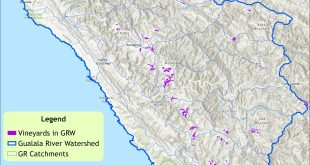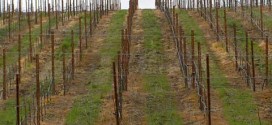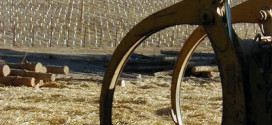To the California Department of Forestry, May, 2002
May 19, 2002
Andrea E. Tuttle, Ph.D., Director
California Department of Forestry and Fire Protection
1416 Ninth Street
Sacramento, Ca 95814
Re: THP/Conversion applications 1-00-147 SON, 1-00-140 SON, 1-00-238 SON, 1-01-171 SON, 1-01-202 SON, 1-01-223 SON, 1-02-019 SON, etc.
Dear Dr. Tuttle:
There are an increasing number of applications to convert timberland to vineyards in the Gualala River watershed. Friends of the Gualala River is concerned that these conversions would do irreparable harm. The ecosystems in the watershed are already under significant pressure. A century of logging operations has led to the buildup of sediment and gravel in the river bed, gradually destroying the river’s capability to support coho salmon, steelhead, and other indigenous species. New clear cuts have accelerated the degradation of the habitat. The use of pesticides and herbicides has exacerbated the degradation.
Conversions of timberland to vineyards appear to Friends of the Gualala River as an even greater threat to the health of the watershed. These conversions involve clear cutting and complete removal of vegetation, resulting in the destruction of the forest ecosystem. They appear to represent a serious threat to productive timberland and to the survival of the region’s wildlife in their constantly shrinking and fragmented habitat. It appears likely that there will be increased sedimentation and increased pesticide and herbicide runoff into the tributaries of the Gualala River.
The Gualala River is already listed as an impaired river under 303(d) of the Clean Water Act. Much money, time, and energy is being spent by individuals, private groups, and State and Federal agencies to restore the watershed and our endangered species. The proposed conversions are likely to negate these efforts.
In addition to sedimentation and pesticide/herbicide runoff in the river itself, vineyard irrigation presents a challenge to water quality throughout the watershed. Those of us who live downstream of the conversions are concerned that the run-off will degrade the quality of the water supplied by the North Gualala Water Company and The Sea Ranch Water Company. Over-pumping of wells to recharge reservoirs can lead to aquifer depletion and impair nearby residential water wells. Stream diversions and surface water interception are deleterious to salmonids because they greatly impact flow and temperature levels critical for their survival.
Friends of the Gualala River urges you to consider the cumulative effects of clear cutting, whether for logging or for vineyard conversion. We ask that you enact a moratorium in the Gualala watershed, on conversion of non-TPZ forest land to vineyards until you complete a comprehensive environmental survey of the watershed. This survey should provide the baseline for analysis of the effects of the conversions on timber resources, water supply, water quality, endangered species, and the cumulative impacts on the region as required by the California Environmental Quality Act.
Thank you for your consideration of this matter.
Ursula Jones
Vice-President
Friends of the Gualala River
PO Box 1543
Gualala, CA 95445
707-467-8676
www.gualalariver.org
 Friends of Gualala River Protecting the Gualala River watershed and the species living within it
Friends of Gualala River Protecting the Gualala River watershed and the species living within it


